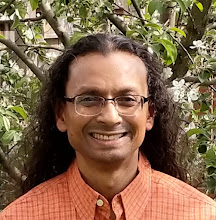
In that portion of the astral plane commonly referred to as heaven, Ganga was late again for Lord Brahma’s lecture. She scrambled to pull up her lehenga and throw on her dupatta (forgetting to secure it) and then ran. When she entered the courtyard, Brahma paused in his discourse and all assembled turned to look at her. If she wasn’t yet embarrassed, the sudden gust of astral wind that blew off her dupatta leaving her exposed made certain she was.
All immediately looked away, and while she was feeling foolish, she felt a bit disappointed that no one cared to steal a glimpse. Covering herself with her arms, she turned to leave when she noticed Mahabhisha staring which lifted her spirits. She lowered her arms suggestively while puckering her lips in his direction.
"Mahabhisha! Ganga! What do the two of you think you are doing? This is heaven for God’s sake!" It was Brahma. "Cover yourself," he said to Ganga as her dupatta appeared in her hands.
"I’m quite dissappointed in you Mahabhisha. I think you need to take birth on earth and learn a lesson or two about lust. And you Ganga are going to teach him. I have spoken," concluded Brahma as he deastralized from view, returning to his abode in the causal plane before either one could argue.
Mahabhisha took Brahma’s command seriously, for he knew his inability to resist a beautiful woman was something he needed to work on. Having been a successful king during past lifetimes on earth, he submitted a request for King Pratipa of Hastinapura to be his father.
Ganga on the other hand didn’t know what to think Me teach? then decided Brahma couldn’t have been serious. She was, though, feeling somewhat aroused after her experience with Mahabhisha and thought a trip to earth might be just the right cure.
Ganga was the apsara for the river Ganges, so she materialized herself on earth in her river form, and was immediately aware of all activity in her waters and on her banks. It was early morning and most were still asleep when she noticed a fit and muscular man with greying temples sitting on her bank. His legs were tightly folded and he had his eyes closed and back straight. She rose from the water in her human form and walked quietly onto the bank to stand before him.
He remained motionless, apparently not aware he had a visitor. She then sat on his right thigh and draped her arms around him to announce her arrival. The man opened his eyes and was quite startled to see this beautiful woman on his lap, but maintained his steady posture nonetheless.
"Is there something I can do for you?" he asked.
"There most certainly is! You can marry me so that we may make passionate love right here and now," she replied enthusiastically.
"I am sorry, but I’m afraid I'll have to decline."
Stunned, Ganga replied, "Am I not beautiful beyond measure? Am I not worthy of being enjoyed in every way?" With her displeasure subsiding, she continued more positively, "I will please you in ways beyond your imagination, so how can you refuse me?"
The man then knew she was an apsara and told Ganga how he and his wife were unable to have children, so they consulted a sage for advice on whether he should take another wife. The sage told them that even a hundred wives would not produce a child, however, ascetic penances would.
"So since I’m now committed to celibacy, I cannot accept your offer." Seeing her disappointment, his heart opened to her and he continued, "But did you know it is customary for a man's wife to sit on his left lap and for his daughter to sit on the right? So since you've chosen my right lap, and if God does grant me a son, I can then accept you as my daughter-in-law instead." to which her face lit up again. She gave her father-in-law-to-be a hug, disappeared back into the river and returned to heaven in excited anticipation.
Brahma was deeply pleased with the man’s adherence to his commitment and granted him the son he desired. His wife conceived that very day, as Brahma accepted the request from a soul in heaven wishing to be this man’s son: it was Mahabhisha. When he was born nine months later, King Pratipa and the Queen named him Santanu.
Footnotes
1. Derived from: Adi Parva, Section XCVI, p. 207.
2. Ganga's proposal: Adi Parva, Section XCVII, p. 208.


That's a sweet story. Wish there was more awareness about lust in these times -- so much pain and suffering, exploitation, and crimes of the heart resulting.
ReplyDeletebeautiful!
ReplyDelete>so much pain and suffering
ReplyDeleteIt's important to remember that every soul wants to experience pain and suffering as an opportunity for growth and development (i.e. choosing love in all cases).